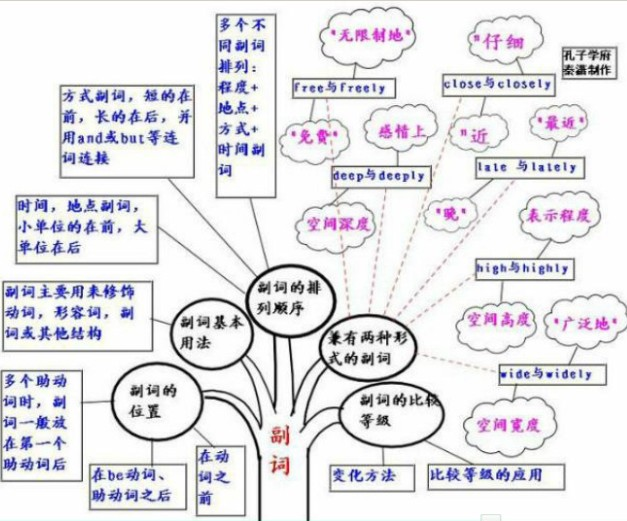本试题 “It _______ this morning that two of the body guards of the prime minister got killed and the ministerhimself got ______ hurt in the violent car bom...” 主要考查您对副词
一般现在时的被动语态
等考点的理解。关于这些考点您可以点击下面的选项卡查看详细档案。
- 副词
- 一般现在时的被动语态
副词的概念:
副词是指在句子中表示行为或状态特征的词,用来修饰动词、形容词、其他副词、介词短语、非谓语动词乃至整个句子,表示时间、地点、程度、方式等概念。
副词的位置:
1)在动词之前。
2)在be动词、助动词之后。
3)多个助动词时,副词一般放在第一个助动词后。
注意:
a. 大多数方式副词位于句尾,但宾语过长,副词可以提前,以使句子平衡。
如:We could see very clearly a strange light ahead of us.
b. 方式副词well,badly糟、坏,hard等只放在句尾。
如:He speaks English well.
副词的排列顺序:
1)时间,地点副词,小单位的在前,大单位在后。
2)方式副词,短的在前,长的在后,并用and或but等连词连接。
如:Please write slowly and carefully.
3)多个不同副词排列:程度+地点+方式+时间副词。
注意:副词very可以修饰形容词,但不能修饰动词。
改错:(错)I very like English.
(对)I like English very much.
注意:副词enough要放在形容词的后面,形容词enough放在名词前后都可。
如:I don't know him well enough.
There is enough food for everyone to eat.
There is food enough for everyone to eat.
兼有两种形式的副词:
1)close与closely:
close意思是“近”;closely意思是“仔细地”。
如: He is sitting close to me.
Watch him closely.
2)late与lately:
late意思是"晚";lately意思是“最近” 。
如:You have come too late.
What have you been doing lately?
3)deep与deeply:
deep意思是“深”,表示空间深度;deeply时常表示感情上的深度,“深深地” 。
如:He pushed the stick deep into the mud.
Even father was deeply moved by the film.
4)high与highly:
high表示空间高度;highly表示程度,相当于much。
如:The plane was flying high.
I think highly of your opinion.
5)wide与widely:
wide表示空间宽度;widely意思是“广泛地”,“在许多地方”。
如:He opened the door wide.
English is widely used in the world.
6)free与freely:
free的意思是“免费”;freely的意思是“无限制地”。
如:You can eat free in my restaurant whenever you like.
You may speak freely, say what you like.
副词知识体系:

一般现在时的被动语态的概念:
表示的是一般现在时态和被动语态的叠合。构成:(am/is/are +done)
如:This shirt is washed once a week. 这件T恤一周洗一次。
主动语态变被动语态的方法:
1、把主动语态的宾语变为被动语态的主语。
2、把谓语变成被动结构(be+过去分词),根据被动语态句子里的主语的人称和数,以及原来主动语态句子中动词的时态来决定be的形式。
3、把主动语态中的主语放在介词by之后作宾语,将主格改为宾格。
例如:All the people laughed at him.=He was laughed at by all people.
They make the bikes in the factory.=The bikes are made by them in the factory.
记忆歌诀:
宾变主,主变宾,by短语后面跟。
谓语动词变被动,be后“过分”来使用。
含有情态动词的被动语态:
含有情态动词的主动句变成被动句时,由“情态动词+be+过去分词”构成,原来带to的情态动词变成被动语态后“to”仍要保留。
记忆歌诀:
情态动词变动,情态加be加“过分”,原来带to要保留。
例如:We can repair this watch in two days.=This watch can be repaired in two days.
You ought to take it away.=It ought to be taken away.
They should do it at once.=It should be done at once.
被动语态的用法:
1、不知道或没有必要说明动作的执行者是谁。
例如:Some new computers were stolen last night.一些新电脑在昨晚被盗了。(不知道电脑是谁偷的)
This book was published in1981.这 本书出版于1981年。
2、强调动作的承受者,而不强调动作的执行者。
例如:This book was written by him. 这本书是他写的。
Eight hours per day for sleep must be guaranteed. 每天8小时睡眠必须得到保证。
记忆歌诀:
谁做的动作不知道,说出谁做的没有必要;动作承受者需强调,被动语态运用到。
一般现在时的被动语态:
一、被动语态的结构:
主语(动作接受者)+is/am/are+动词的过去分词+(by+动作执行者)
如:Football is played in most countries in the world.
被动语态的句型总结如下:
1、肯定句:主语+be+过去分词+(by~~).
如:The boy is called Jack.
2、否定句:主语+be not+过去分词+(by~~).
如:The baby is not looked after by his father.
3、一般疑问句:Be+主语+过去分词+(by~~)?
如:Is KingLear written by Shakespeare?
4、特殊疑问句:特殊疑词+be+过去分词+(by~~)?
如:What is this kind of sweater made of?
二、被动语态的用法:
1、要表达“被…”、“受…”、“让…”、“遭…”之类的语义。
如:The teachers are well respected.
The child is well loved by people.
2、强调动作承受者。
如:He is known far and wide. 他远近闻名。
3、不知道式没有必要指出动作的执行者。
如: The room is cleaned every day. 房子每天都有人打扫。
4、为礼貌起见避免提及动作执行者。
如:I wonder if I was allowed to introduce myself? 我是否可以做自我介绍?
与“It _______ this morning that two of the body guards of th...”考查相似的试题有:
- The man to whom we handed the forms pointed out that they had not been _____ filled in.[ ]A. slightlyB. properlyC. re...
- His health is ______improving. I'm sure he will come back to work soon.A.graduallyB.frequentlyC.fluentlyD.finally
- —Are you going to Dalian by air?—No, the tickets are ____expensive for me.A.very muchB.so muchC.far tooD.too much
- Progress so far has been very good.______,we are sure that the project will be completed on time.A.HoweverB.Otherw...
- He had planned to make a compromise,but he changed his mind at the last minute.A.thereforeB.otherwiseC.anyhowD....
- It is extremely hot this summer. __________, many people say it has been the hottest in the past 30 years.A.Frequen...
- The heart is _____ intelligent than the stomach, for they are both controlled by the brain.A.not lessB.not moreC.n...
- Months ago we sailed ten thousand miles across this open sea, which _______ the Pacific, and we met no storms.A. was ...
- London is one of the best places in the world to _____ education with pleasure, so it’s good for your pupils.A.compa...
- Afetr dinner he gave Mr. Richardson ________ride to ________Capital Airport.A.the, aB.a theC./, aD./, the